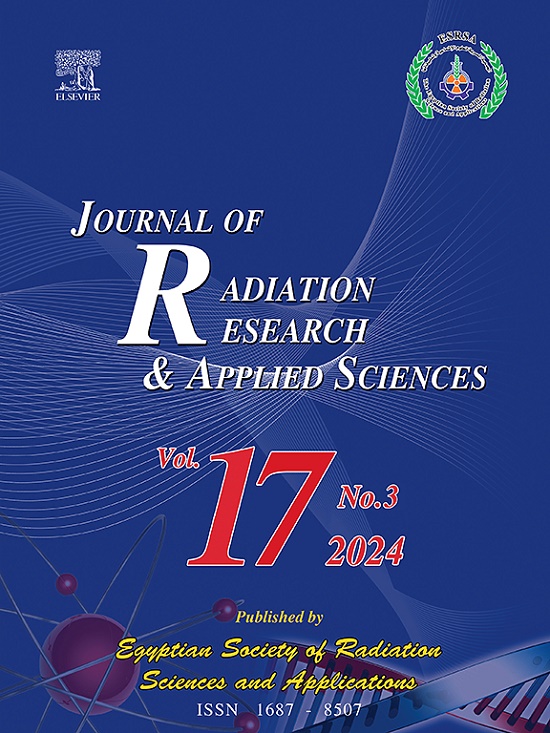The impact of radiologists’ characteristics on the detection of COVID-19 in chest CT scans
IF 1.7
4区 综合性期刊
Q2 MULTIDISCIPLINARY SCIENCES
Journal of Radiation Research and Applied Sciences
Pub Date : 2024-11-02
DOI:10.1016/j.jrras.2024.101170
引用次数: 0
Abstract
Purpose
To retrospectively assess the relationships between radiologists’ characteristics and their performance in interpreting chest CTs for COVID-19 detection.
Methods
Using DetectedX software, performance data were collected online from 74 radiologists from 29 countries, who each interpreted 30 anonymized digital chest CTs (15 positive and 15 negative scans for COVID-19). Radiologist-specific information was also collected: radiology experience, radiological specialty, number of lung CTs read weekly, familiarity with and education about COVID-19 presentation, and suspected COVID-19 cases seen weekly. The influence of this radiologist-specific information on the radiologists’ sensitivity, specificity, and ROC AUC was determined using regression analysis.
Results
Radiologists without respiratory imaging specialization had greater ROC AUCs (0.83 vs. 0.70, p = .006) and sensitivities (74.0% vs. 47.7%, p = .002) than their specialized peers. Radiologists without COVID-19 case encounters had greater sensitivity (80.6% vs. 63.1%, p = .017) but lower specificity (71.1% vs. 83.4%, p = .014) than those who encountered at least one case weekly.
Conclusion
Specialization and prior experience with COVID-19 may impact the interpretation of suspected COVID-19 chest CTs.
Clinical significance
These results show the importance of diverse expertise and continuous training in managing novel diseases like COVID-19. Incorporating varied perspectives and experiences could enhance diagnostic accuracy and ensure a more comprehensive approach to disease management. In the case of novel diseases, specialization may not provide the same advantage as with more familiar disorders. The diagnostic value of specific experience with a novel disorder may help to compensate for a lack of specialization in the field, particularly in emergent situations. While specialization is important, generalization also holds value and utility in appropriate contexts.
放射科医生的特点对胸部 CT 扫描中 COVID-19 检测结果的影响
方法使用 DetectedX 软件在线收集来自 29 个国家的 74 名放射科医生的绩效数据,他们每人负责解读 30 份匿名数字胸部 CT(15 份 COVID-19 阳性扫描和 15 份阴性扫描)。此外,还收集了放射科医生的特定信息:放射科经验、放射科专业、每周阅读的肺部 CT 数量、对 COVID-19 表现的熟悉程度和教育程度以及每周接诊的疑似 COVID-19 病例。结果没有呼吸成像专业背景的放射科医生的 ROC AUCs(0.83 vs. 0.70,p = .006)和敏感性(74.0% vs. 47.7%,p = .002)均高于其专业同行。与每周至少遇到一个病例的放射科医生相比,没有遇到过 COVID-19 病例的放射科医生的敏感性更高(80.6% 对 63.1%,p = .017),但特异性较低(71.1% 对 83.4%,p = .014)。临床意义这些结果表明,在处理 COVID-19 等新型疾病时,多样化的专业知识和持续培训非常重要。纳入不同的观点和经验可提高诊断的准确性,并确保采用更全面的方法进行疾病管理。就新型疾病而言,专业化可能无法提供与更熟悉的疾病相同的优势。对新型疾病的特定经验所具有的诊断价值可能有助于弥补该领域专业化程度的不足,尤其是在紧急情况下。专业化固然重要,但在适当的情况下,概括化也有其价值和作用。
本文章由计算机程序翻译,如有差异,请以英文原文为准。
求助全文
约1分钟内获得全文
求助全文
来源期刊

Journal of Radiation Research and Applied Sciences
MULTIDISCIPLINARY SCIENCES-
自引率
5.90%
发文量
130
审稿时长
16 weeks
期刊介绍:
Journal of Radiation Research and Applied Sciences provides a high quality medium for the publication of substantial, original and scientific and technological papers on the development and applications of nuclear, radiation and isotopes in biology, medicine, drugs, biochemistry, microbiology, agriculture, entomology, food technology, chemistry, physics, solid states, engineering, environmental and applied sciences.
 求助内容:
求助内容: 应助结果提醒方式:
应助结果提醒方式:


